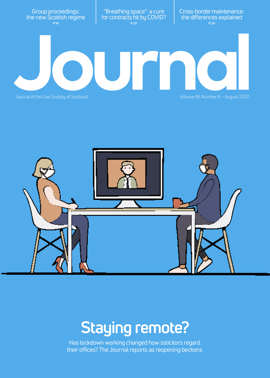Property: Code to recovery
Collaboration, open dialogue and mutual support are key to overcoming the unprecedented challenges facing the commercial property sector in Scotland as a consequence of the COVID-19 pandemic.
With tenants, commercial landlords, investors and lenders experiencing significant financial pressures, there is a vital and shared need for all parties to generate joint solutions that are flexible in the short term and sustainable in the long term, as we continue to suppress the virus and restart the economy.
The Scottish Government is supporting businesses through the pandemic using a range of regulatory, fiscal and monetary measures, as well as offering advice and regular updates.
Collective work
Specifically in relation to commercial property, early action was taken, as part of the Coronavirus (Scotland) Act 2020, to support businesses to remain in their properties even if rent could not be paid. Following the latest three-monthly review of the Act on 24 June, it was decided to keep those anti-irritancy measures in place.
Under these measures, commercial leases cannot currently be terminated for non-payment of rent for a period of 14 weeks, rather than the previous 14 day period. I encourage parties to use this time to reach mutually agreed solutions that enable businesses to return to trading and generate income. It is in no one’s interests for viable businesses to be closed and properties to become vacant.
To aid with this collective response, my team and I worked with the UK Government to introduce the code of practice for commercial property relationships during the COVID-19 pandemic. The code covers the whole of the UK and is intended to promote good practice between landlords and tenants as they deal with the financial shocks and uncertainty caused by the pandemic.
As a voluntary code, it does not change the legal relationship or lease contract already in place between landlord and tenant, and any guarantor. However, both the Scottish Government and the UK Government strongly encourage landlords and tenants to utilise the code and urge lenders to continue providing support as proactively as possible to enable tenancies to endure, to sustain jobs and to maintain productive capacity. Contributing to a successful restart of our economy is something we all have a shared interest in.
Be transparent
The key principles of the code are transparency and collaborative communication to create a unified approach. Our common goal is business continuity that extends beyond the pandemic, providing more stability and assurance for everyone. But we recognise that even if landlords and tenants utilise the code in their discussions, the desired outcome may not be achieved. In these cases, a third party mediator may be beneficial in facilitating discussions to help achieve a negotiated arrangement.
If you are a commercial tenant seeking rent concessions from your landlord, for example, openly and transparently sharing appropriate financial information will allow landlords to understand what concessions will support you back towards generating income and paying the rent in the future.
Landlords should provide concessions where they reasonably can whilst considering their own circumstances. If a landlord refuses a concession, they should be equally open and transparent and make it clear to the tenant why this decision was made.
Towards recovery
The aim of the code is to facilitate these types of discussions in order to allow the creation of a shared recovery plan for temporary and sustainable solutions outside the arrangements of the current lease. However, the code does not change the legal responsibilities of either party, and tenants are still legally liable for payment obligations – tenants who can still pay in full or in part should continue to do so.
Through the pandemic, buildings need to continue to be insured and maintained. Landlords need to think about the impact service charges and insurance costs have on a tenant’s finances. If the property has been used less, service charge costs should be lowered accordingly to provide the best value for tenants. However, as these are both non-profit making charges, proportionate essential costs should continue to be paid by the tenant wherever possible.
Taken together with the anti-irritancy measures, the code will help to provide the breathing space for tenants, landlords and lenders to work together on a plan for a sustainable future. Its principles are supported by many representative bodies, from both the landlords’ and tenants’ perspectives, including the British Property Federation, Royal Institution of Chartered Surveyors, British Retail Consortium and Federation of Small Businesses.
The transition back to normality will take time and the Scottish Government will continue to monitor the economy to determine whether further intervention is necessary.
The code of practice represents a good starting point on our road to economic recovery and I strongly encourage all relevant parties to use it.
The code of practice can be found at this link.
Regulars
Perspectives
Features
Briefings
- Criminal court briefing: Coronapocalypse?
- Employment: Unfairly anonymous?
- Family: When experts miss the mark
- Human rights: Judicial review refusal does not need oral hearing
- Pensions: Members' benefits: compensation and protection action
- Scottish Solicitors' Discipline Tribunal
- Property: Code to recovery
- In-house: “So, how are you?”







